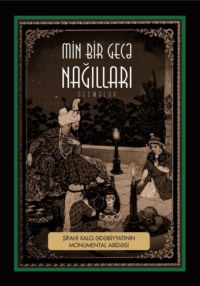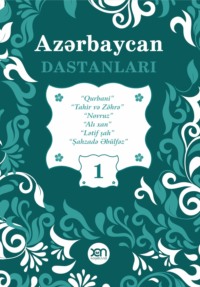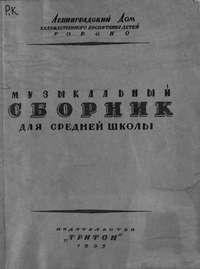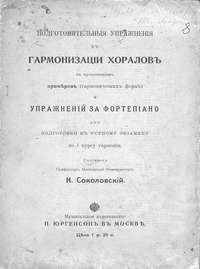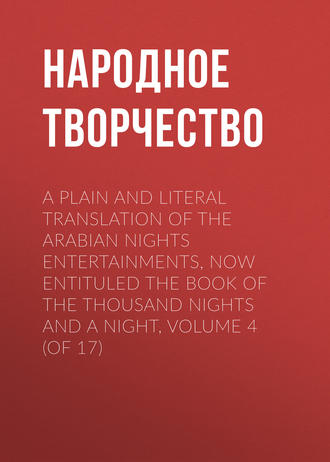 полная версия
полная версияA plain and literal translation of the Arabian nights entertainments, now entituled The Book of the Thousand Nights and a Night, Volume 4 (of 17)
She said, It hath reached me, O auspicious King, that King Ghayur set out with his daughter and his host for his own land, and they took with them Amjad and returned home by easy marches. And when Ghayur was settled again in his kingdom, he made his grandson King in his stead; and as to Kamar al-Zaman he also made As’ad king in his room over the capital of the Ebony Islands, with the consent of his grandfather, King Armanus and set out himself, with his father, King Shahriman, till the two made the Islands of Khalidan. Then the lieges decorated the city in their honour and they ceased not to beat the drums for glad tidings a whole month; nor did Kamar al-Zaman leave to govern in his father’s place, till there overtook them the Destroyer of delights and the Sunderer of societies; and Allah knoweth all things! Quoth King Shahryar, “O Shahrazad, this is indeed a most wonderful tale!” And she answered, “O King, it is not more wonderful than that of
ALA AL-DIN ABU AL-SHAMAT.” 24
“What is that?” asked he, and she said, It hath reached me that there lived, in times of yore and years and ages long gone before, a merchant of Cairo25 named Shams al-Din, who was of the best and truest-spoken of the traders of the city; and he had eunuchs and servants and negro-slaves and handmaids and Mamelukes and great store of money. Moreover, he was Consul26 of the Merchants of Cairo and owned a wife, whom he loved and who loved him; except that he had lived with her forty years, yet had not been blessed with a son or even a daughter. One day, as he sat in his shop, he noted that the merchants, each and every, had a son or two sons or more sitting in their shops like their sires. Now the day being Friday; he entered the Hammam-bath and made the total ablution: after which he came out and took the barber’s glass and looked in it, saying, “I testify that there is no god but the God and I testify that Mohammed is the Messenger of God!” Then he considered his beard and, seeing that the white hairs in it covered the black, bethought himself that hoariness is the harbinger of death. Now his wife knew the time of his coming home and had washed and made herself ready for him, so when he came in to her, she said, “Good evening,” but he replied “I see no good.” Then she called to the handmaid, “Spread the supper-tray;” and when this was done quoth she to her husband, “Sup, O my lord.” Quoth he, “I will eat nothing,” and pushing the tray away with his foot, turned his back upon her. She asked, “Why dost thou thus? and what hath vexed thee?”; and he answered, “Thou art the cause of my vexation.” – And Shahrazad perceived the dawn of day and ceased saying her permitted say.
Now when it was the Two Hundred and Fiftieth Night,She said, It hath reached me, O auspicious King, that Shams al-Din said to his wife, “Thou art the cause of my vexation.” She asked, “Wherefore?” and he answered, “When I opened my shop this morning, I saw that each and every of the merchants had with him a son or two sons or more, sitting in their shops like their fathers; and I said to myself: – He who took thy sire will not spare thee. Now the night I first visited thee,27 thou madest me swear that I would never take a second wife over thee nor a concubine, Abyssinian or Greek or handmaid of other race; nor would lie a single night away from thee: and behold, thou art barren, and having thee is like boring into the rock.” Rejoined she, “Allah is my witness that the fault lies with thee, for that thy seed is thin.” He asked, “And what showeth the man whose semen is thin?” And she answered, “He cannot get women with child, nor beget children.” Quoth he, “What thickeneth the seed? tell me and I will buy it: haply, it will thicken mine.” Quoth she, “Enquire for it of the druggists.” So he slept with her that night and arose on the morrow, repenting of having spoken angrily to her; and she also regretted her cross words. Then he went to the market and, finding a druggist, saluted him; and when his salutation was returned said to him, “Say, hast thou with thee a seed-thickener?” He replied, “I had it, but am out of it: enquire thou of my neighbour.” Then Shams al-Din made the round till he had asked every one, but they all laughed at him, and presently he returned to his shop and sat down, sore troubled. Now there was in the bazar a man who was Deputy Syndic of the brokers and was given to the use of opium and electuary and green hashísh.28 He was called Shaykh Mohammed Samsam and being poor he used to wish Shams al-Din good morrow every day. So he came to him according to his custom and saluted him. The merchant returned his salute, but in ill-temper, and the other, seeing him vexed, said, “O my lord, what hath crossed thee?” Thereupon Shams al-Din told him all that occurred between himself and his wife, adding, “These forty years have I been married to her yet hath she borne me neither son nor daughter; and they say: – The cause of thy failure to get her with child is the thinness of thy seed; so I have been seeking a something wherewith to thicken my semen but found it not.” Quoth Shaykh Mohammed, “O my lord, I have a seed-thickener, but what wilt thou say to him who causeth thy wife to conceive by thee after these forty years have passed?” Answered the merchant, “If thou do this, I will work thy weal and reward thee.” “Then give me a dinar,” rejoined the broker, and Shams al-Din said, “Take these two dinars.” He took them and said, “Give me also yonder big bowl of porcelain.” So he gave it to him and the broker betook himself to a hashish-seller, of whom he bought two ounces of concentrated Roumi opium and equal parts of Chinese cubebs, cinnamon, cloves, cardamoms, ginger, white pepper and mountain skink29; and, pounding them all together, boiled them in sweet olive-oil; after which he added three ounces of male frankincense in fragments and a cupful of coriander-seed; and, macerating the whole, made it into an electuary with Roumi bee-honey. Then he put the confection in the bowl and carried it to the merchant, to whom he delivered it, saying, “Here is the seed-thickener, and the manner of using it is this. Take of my electuary with a spoon after supping, and wash it down with a sherbet made of rose conserve; but first sup off mutton and house-pigeon plentifully seasoned and hotly spiced.” So the merchant bought all this and sent the meat and pigeons to his wife, saying; “Dress them deftly and lay up the seed-thickener until I want it and call for it.” She did his bidding and, when she served up the meats, he ate the evening meal, after which he called for the bowl and ate of the electuary. It pleased him well, so he ate the rest and knew his wife. That very night she conceived by him and, after three months, her courses ceased, no blood came from her and she knew that she was with child. When the days of her pregnancy were accomplished, the pangs of labour took her and they raised loud lullilooings and cries of joy. The midwife delivered her with difficulty, by pronouncing over the boy at his birth the names of Mohammed and Ali, and said, “Allah is Most Great!”; and she called in his ear the call to prayer. Then she wrapped him up and passed him to his mother, who took him and gave him the breast; and he sucked and was full and slept. The midwife abode with them three days, till they had made the mothering-cakes of sugared bread and sweetmeats; and they distributed them on the seventh day. Then they sprinkled salt against the evil eye and the merchant, going in to his wife, gave her joy of her safe delivery, and said, “Where is Allah’s deposit?” So they brought him a babe of surpassing beauty, the handiwork of the Orderer who is ever present and, though he was but seven days old, those who saw him would have deemed him a yearling child. So the merchant looked on his face and, seeing it like a shining full moon, with moles on either cheek, said he to his wife, “What hast thou named him?” Answered she, “If it were a girl I had named her; but this is a boy, so none shall name him but thou.” Now the people of that time used to name their children by omens; and, whilst the merchant and his wife were taking counsel of the name, behold, one said to his friend, “Ho my lord, Ala al-Din!” So the merchant said, “We will call him Ala al-Din Abú al-Shámát.”30 Then he committed the child to the nurse, and he drank milk two years, after which they weaned him and he grew up and throve and walked upon the floor. When he came to seven years old, they put him in a chamber under a trap-door, for fear of the evil eye, and his father said, “He shall not come out, till his beard grow.” So he gave him in charge to a handmaid and a blackamoor; the girl dressed him his meals and the slave carried them to him. Then his father circumcised him and made him a great feast; after which he brought him a doctor of the law, who taught him to write and read and repeat the Koran, and other arts and sciences, till he became a good scholar and an accomplished. One day it so came to pass that the slave, after bringing him the tray of food went away and left the trap-door open: so Ala al-Din came forth from the vault and went in to his mother, with whom was a company of women of rank. As they sat talking, behold, in came upon them the youth as he were a white slave drunken31 for the excess of his beauty; and when they saw him, they veiled their faces and said to his mother, “Allah requite thee, O such an one! How canst thou let this strange Mameluke in upon us? Knowest thou not that modesty is a point of the Faith?” She replied, “Pronounce Allah’s name32 and cry Bismillah! this is my son, the fruit of my vitals and the heir of Consul Shams al-Din, the child of the nurse and the collar and the crust and the crumb.”33 Quoth they, “Never in our days knew we that thou hadst a son”; and quoth she, “Verily his father feared for him the evil eye and reared him in an under-ground chamber;” – And Shahrazad perceived the dawn of day and ceased saying her permitted say.
Now when it was the Two Hundred and Fifty-first Night,She said, It hath reached me, O auspicious King, that Ala-al-Din’s mother said to her lady-friends, “Verily his father feared for him the evil eye and reared him in an under-ground chamber; and haply the slave forgot to shut the door and he fared forth; but we did not mean that he should come out, before his beard was grown.” The women gave her joy of him, and the youth went out from them into the court yard where he seated himself in the open sitting-room; and behold, in came the slaves with his father’s she-mule, and he said to them, “Whence cometh this mule?” Quoth they, “We escorted thy father when riding her to the shop, and we have brought her back.” He asked, “What may be my father’s trade?”; and they answered, “Thy father is Consul of the merchants in the land of Egypt and Sultan of the Sons of the Arabs.” Then he went in to his mother and said to her, “O my mother, what is my father’s trade?” Said she, “O my son, thy sire is a merchant and Consul of the merchants in the land of Egypt and Sultan of the Sons of the Arabs. His slaves consult him not in selling aught whose price is less than one thousand gold pieces, but merchandise worth him an hundred and less they sell at their own discretion; nor doth any merchandise whatever, little or muchel, leave the country without passing through his hands and he disposeth of it as he pleaseth; nor is a bale packed and sent abroad amongst folk but what is under his disposal. And Almighty Allah, O my son, hath given thy father monies past compt.” He rejoined, “O my mother, praised be Allah, that I am son of the Sultan of the Sons of the Arabs and that my father is Consul of the merchants! But why, O my mother, do ye put me in the under-ground chamber and leave me prisoner there?” Quoth she, “O my son, we imprisoned thee not save for fear of folks’ eyes: ‘the evil eye is a truth,’34 and most of those in their long homes are its victims.” Quoth he, “O my mother, and where is a refuge-place against Fate? Verily care never made Destiny forbear, nor is there flight from what is written for every wight. He who took my grandfather will not spare myself nor my father; for, though he live to-day he shall not live to-morrow. And when my father dieth and I come forth and say: – I am Ala al-Din, son of Shams al-Din the merchant, none of the people will believe me, but men of years and standing will say: – In our lives never saw we a son or a daughter of Shams al-Din. Then the public Treasury will come down and take my father’s estate, and Allah have mercy on him who said: – The noble dieth and his wealth passeth away, and the meanest of men take his women. Therefore, O my mother, speak thou to my father, that he carry me with him to the bazar and open for me a shop; so may I sit there with my merchandise and teach me to buy and sell and take and give.” Answered his mother, “O my son, as soon as thy sire returneth I will tell him this.” So when the merchant came home, he found his son Ala al-Din Abu al-Shamat sitting with his mother and said to her, “Why hast thou brought him forth of the under-ground chamber?” She replied, “O son of my uncle, it was not I that brought him out; but the servants forgot to shut the door and left it open; so, as I sat with a company of women of rank, behold, he came forth and walked in to me.” Then she went on to repeat to him his son’s words; so he said, “O my son, to-morrow, Inshallah! I will take thee with me to the bazar; but, my boy, sitting in markets and shops demandeth good manners and courteous carriage in all conditions.” Ala al-Din passed the night rejoicing in his father’s promise and, when the morrow came, the merchant carried him to the Hammam and clad him in a suit worth a mint of money. As soon as they had broken their fast and drunk their sherbets, Shams al-Din mounted his she-mule and putting his son upon another, rode to the market, followed by his boy. But when the market-folk saw their Consul making towards them, foregoing a youth as he were a slice of the full moon on the fourteenth night, they said, one to other, “See thou yonder boy behind the Consul of the merchants; verily, we thought well of him, but he is, like the leek, gray of head and green at heart.”35 And Shaykh Mohammed Samsam, Deputy Syndic of the market, the man before mentioned, said to the dealers, “O merchants, we will not keep the like of him for our Shaykh; no, never!” Now it was the custom anent the Consul when he came from his house of a morning and sat down in his shop, for the Deputy Syndic of the market to go and recite to him and to all the merchants assembled around him the Fátihah or opening chapter of the Koran,36 after which they accosted him one by one and wished him good morrow and went away, each to his business-place. But when Shams al-Din seated himself in his shop that day as usual, the traders came not to him as accustomed; so he called the Deputy and said to him, “Why come not the merchants together as usual?” Answered Mohammed Samsam, “I know not how to tell thee these troubles, for they have agreed to depose thee from the Shaykh-ship of the market and to recite the Fatihah to thee no more.” Asked Shams al-Din, “What may be their reason?”; and asked the Deputy, “What boy is this that sitteth by thy side and thou a man of years and chief of the merchants? Is this lad a Mameluke or akin to thy wife? Verily, I think thou lovest him and inclinest lewdly to the boy.” Thereupon the Consul cried out at him, saying, “Silence, Allah curse thee, genus and species! This is my son.” Rejoined the Deputy, “Never in our born days have we seen thee with a son,” and Shams al-Din answered, “When thou gavest me the seed-thickener, my wife conceived and bare this youth; but I reared him in a souterrain for fear of the evil eye, nor was it my purpose that he should come forth, till he could take his beard in his hand.37 However, his mother would not agree to this, and he on his part begged I would stock him a shop and teach him to sell and buy.” So the Deputy Syndic returned to the other traders and acquainted them with the truth of the case, whereupon they all arose to accompany him; and, going in a body to Shams al-Din’s shop, stood before him and recited the “Opener” of the Koran; after which they gave him joy of his son and said to him, “The Lord prosper root and branch! But even the poorest of us, when son or daughter is born to him, needs must cook a pan-full of custard38 and bid his friends and kith and kin; yet hast thou not done this.” Quoth he, “This I owe you; be our meeting in the garden.” – And Shahrazad perceived the dawn of day and ceased to say her permitted say.
Now when it was the Two Hundred and Fifty-second Night,Her sister Dunyazad said to her, “Pray continue thy story for us, an thou be awake and not inclined to sleep.” Quoth she: – With pleasure and goodwill: it hath reached me, O auspicious King, that the Consul of the merchants promised them a banquet and said “Be our meeting in the garden.” So when morning dawned he despatched the carpet-layer to the saloon of the garden-pavilion and bade him furnish the two. Moreover, he sent thither all that was needful for cooking, such as sheep and clarified butter and so forth, according to the requirements of the case; and spread two tables, one in the pavilion and another in the saloon. Then Shams al-Din and his boy girded themselves, and he said to Ala al-Din “O my son, whenas a greybeard entereth, I will meet him and seat him at the table in the pavilion; and do thou, in like manner, receive the beardless youths and seat them at the table in the saloon.” He asked, “O my father, why dost thou spread two tables, one for men and another for youths?”; and he answered, “O my son, the beardless is ashamed to eat with the bearded.” And his son thought this his answer full and sufficient. So when the merchants arrived, Shams al-Din received the men and seated them in the pavilion, whilst Ala al-Din received the youths and seated them in the saloon. Then the food was set on and the guests ate and drank and made merry and sat over their wine, whilst the attendants perfumed them with the smoke of scented woods, and the elders fell to conversing of matters of science and traditions of the Prophet. Now there was amongst them a merchant called Mahmúd of Balkh, a professing Moslem but at heart a Magian, a man of lewd and mischievous life who loved boys. And when he saw Ala al-Din from whose father he used to buy stuffs and merchandise, one sight of his face sent him a thousand sighs and Satan dangled the jewel before his eyes, so that he was taken with love-longing and desire and affection and his heart was filled with mad passion for him. Presently he arose and made for the youths, who stood up to receive him; and at this moment Ala al-Din being taken with an urgent call of Nature, withdrew to make water; whereupon Mahmud turned to the other youths and said to them, “If ye will incline Ala al-Din’s mind to journeying with me, I will give each of you a dress worth a power of money.” Then he returned from them to the men’s party; and, as the youths were sitting, Ala al-Din suddenly came back, when all rose to receive him and seated him in the place of highest honour. Presently, one of them said to his neighbour, “O my lord Hasan, tell me whence came to thee the capital whereon thou tradest.” He replied, “When I grew up and came to man’s estate, I said to my sire: – O my father, give me merchandise. Quoth he: – O my son, I have none by me; but go thou to some merchant and take of him money and traffic with it; and so learn to buy and sell, give and take. So I went to one of the traders and borrowed of him a thousand dinars, wherewith I bought stuffs and carrying them to Damascus, sold them there at a profit of two for one. Then I bought Syrian stuffs and carrying them to Aleppo, made a similar gain of them; after which I bought stuffs of Aleppo and repaired with them to Baghdad, where I sold them with like result, two for one; nor did I cease trading upon my capital till I was worth nigh ten thousand ducats.” Then each of the others told his friend some such tale, till it came to Ala al-Din’s turn to speak, when they said to him, “And thou, O my lord Ala al-Din?” Quoth he, “I was brought up in a chamber under-ground and came forth from it only this week; and I do but go to the shop and return home from the shop.” They remarked, “Thou art used to wone at home and wottest not the joys of travel, for travel is for men only.” He replied, “I reck not of voyaging and wayfaring doth not tempt me.” Whereupon quoth one to the other, “This one is like the fish: when he leaveth the water he dieth.” Then they said to him, “O Ala al-Din, the glory of the sons of the merchants is not but in travel for the sake of gain.” Their talk angered him; so he left them weeping-eyed and heavy-hearted and mounting his mule returned home. Now his mother saw him in tears and in bad temper and asked him, “What hath made thee weep, O my son?”; and he answered, “Of a truth, all the sons of the merchants put me to shame and said: – Naught is more glorious for a merchant’s son than travel for gain and to get him gold.” – And Shahrazad perceived the dawn of day and ceased saying her permitted say.
Now when it was the Two Hundred and Fifty-third Night,She said, It hath reached me, O auspicious King, that Ala al-Din said to his mother, “Of a truth all the sons of the merchants put me to shame and said: – Naught is more honourable for a merchant’s son than travel for gain.” “O my son, hast thou a mind to travel?” “Even so!” “And whither wilt thou go?” “To the city of Baghdad; for there folk make double the cost price on their goods.” “O my son, thy father is a very rich man and, if he provide thee not with merchandise, I will supply it out of my own monies.” “The best favour is that which is soonest bestowed; if this kindness is to be, now is the time.” So she called the slaves and sent them for cloth-packers; then, opening a store-house, brought out ten loads of stuffs, which they made up into bales for him. Such was his case; but as regards his father, Shams al-Din, he looked about and failed to find Ala al-Din in the garden and enquiring after him, was told that he had mounted mule and gone home; so he too mounted and followed him. Now when he entered the house, he saw the bales ready bound and asked what they were; whereupon his wife told him what had chanced between Ala al-Din and the sons of the merchants; and he cried, “O my son, Allah’s malison on travel and stranger-hood! Verily Allah’s Apostle (whom the Lord bless and preserve!) hath said: – It is of a man’s happy fortune that he eat his daily bread in his own land; and it was said of the ancients: – Leave travel, though but for a mile.” Then quoth he to his son, “Say, art thou indeed resolved to travel and wilt thou not turn back from it?” Quoth the other, “There is no help for it but that I journey to Baghdad with merchandise, else will I doff clothes and don dervish gear and fare a-wandering over the world.” Shams al-Din rejoined, “I am no penniless pauper but have great plenty of wealth;” then he showed him all he owned of monies and stuffs and stock-in-trade and observed, “With me are stuffs and merchandise befitting every country in the world.” Then he showed him among the rest, forty bales ready bound, with the price, a thousand dinars, written on each, and said, “O my son take these forty loads, together with the ten which thy mother gave thee, and set out under the safeguard of Almighty Allah. But, O my child, I fear for thee a certain wood in thy way, called the Lion’s Copse,39 and a valley hight the Vale of Dogs, for there lives are lost without mercy.” He said, “How so, O my father?”; and he replied, “Because of a Badawi bandit named Ajlán.” Quoth Ala al-Din, “Such is Allah’s luck; if any share of it be mine, no harm shall hap to me.” Then they rode to the cattle-bazar, where behold, a cameleer40 alighted from his she-mule and kissing the Consul’s hand, said to him, “O my lord, it is long, by Allah, since thou hast employed us in the way of business.” He replied, “Every time hath its fortune and its men,41 and Allah have ruth on him who said: —
And the old man crept o’er the worldly ways ✿ So bowed, his beard o’er his knees down flow’th:Quoth I: – What gars thee so doubled go? ✿ Quoth he (as to me his hands he show’th)My youth is lost, in the dust it lieth; ✿ And see, I bend me to find my youth.”42Now when he had ended his verses, he said, “O chief of the caravan, it is not I who am minded to travel, but this my son.” Quoth the cameleer, “Allah save him for thee.” Then the Consul made a contract between Ala al-Din and the man, appointing that the youth should be to him as a son, and gave him into his charge, saying, “Take these hundred gold pieces for thy people.” Moreover he bought his son threescore mules and a lamp and a tomb-covering for the Sayyid Abd al-Kadir of Gílán43 and said to him, “O my son, while I am absent, this is thy sire in my stead: whatsoever he biddeth thee, do thou obey him.” So saying, he returned home with the mules and servants and that night they made a Khitmah or perlection of the Koran and held a festival in honour of the Shaykh Abd al-Kadir al-Jiláni. And when the morrow dawned, the Consul gave his son ten thousand dinars, saying, “O my son, when thou comest to Baghdad, if thou find stuffs easy of sale, sell them; but if they be dull, spend of these dinars.” Then they loaded the mules and, taking leave of one another, all the wayfarers setting out on their journey, marched forth from the city. Now Mahmud of Balkh had made ready his own venture for Baghdad and had moved his bales and set up his tents without the walls, saying in himself, “Thou shalt not enjoy this youth but in the desert, where there is neither spy nor marplot to trouble thee.” It chanced that he had in hand a thousand dinars which he owed to the youth’s father, the balance of a business-transaction between them; so he went and bade farewell to the Consul, who charged him, “Give the thousand dinars to my son Ala al-Din;” and commended the lad to his care, saying, “He is as it were thy son.” Accordingly, Ala al-Din joined company with Mahmud of Balkh – And Shahrazad perceived the dawn of day and ceased to say her permitted say.


